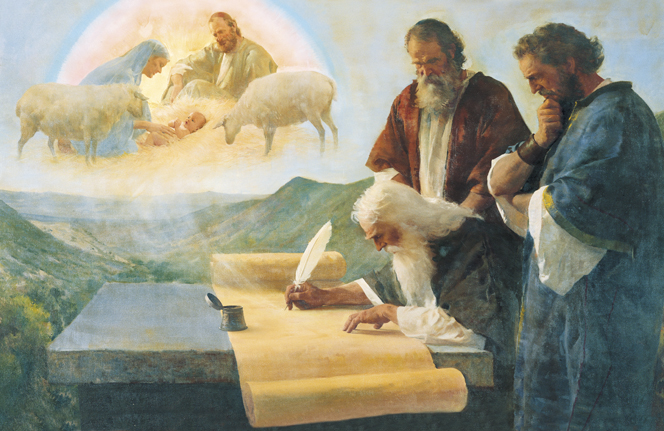Understanding Isaiah
 Institute this morning was about Isaiah.
Institute this morning was about Isaiah.Instead of lecturing, our teacher divided the class into groups, assigned us a chapter of Isaiah (as it was quoted by Jacob, in the book of 2 Nephi) as well as some photocopies of commentaries about those chapters, that we could use to help us decipher them. We were then given about 1/2 hour to read and study them, and then each group sent a volunteer to share with the rest of the class what we learned in our group. Specifically, we were looking for who each chapter was written for (i.e. the people of his day, the people of our day, righteous Israelites, less righteous Israelites, etc), what he was writing about (for example: Christ, the 2nd coming, love, etc.) and also what symbols he used and what they mean.
We separated into our groups, read the chapter we were assigned, read the other materials we were given, discussed what it meant, wrote down what we discussed, and assigned someone to share with the class what we figured out. I thought it was interesting that as the sister from our group shared the things we had talked about, her interpretations of some of those things were different from the ones I had, even though we were in the same group, part of the same discussion. I just came away with a slightly different understanding than she did.
For some time, I have felt the need to understand better what Isaiah is talking about, and yet, so often his words seem totally foreign. Yes, it may be an English translation that I'm reading, but that doesn't make it in my language. There are so many symbols and allusions and references that while I feel like I get a general gist of what I'm reading, at the same time I am aware that there is a lot that flies over my head. There are verses that I gloss over because I have no idea what the good prophet is talking about. Sometimes it seems like Isaiah is switching between being himself, and being the Lord talking to Isaiah, or the Lord talking to Israel, or Israel talking to the Lord, or is it Israel talking to Isaiah?
At a Great Church Book Exchange a few weeks ago, I picked up a book to help me understand Isaiah. This book, Isaiah: Prophet, Seer, and Poet (by Victor L. Ludlow) goes through the book of Isaiah chapter by chapter, explaining the symbols and who is talking to who. It uses different translations, as well as comparing the Book of Mormon translation to the King James Version, and the Joseph Smith's translation. The author discusses parallelism and poetry forms as well as contract law and history. He talks about what other prophets had to say about Isaiah's writings, or about the same subjects Isaiah wrote about. I have found his book to be a wonderful resource to help me understand what I'm reading.
And still, I wonder. Am I coming away from each chapter with the same understanding that someone else would come away with? Am I getting everything out of the words that I need to be getting? Or is there still more there that I'm just not yet prepared to glean? If two people can be part of the exact same conversation with the exact same references and materials, and come out with two different interpretations, is there any way to really know if one is more correct than the other? Or is there more that neither person is getting? Is there hope? The answers are probably no, no, yes, no, yes and yes.
Yes, there is definitely hope. As I read through Isaiah with Brother Ludlow's book, I can learn from what he has to say about it at the level that I am currently prepared to receive it. If I come back to it a few years down the road, maybe with a different resource book, but even with the same one, I will probably learn more and come to a better understanding than I currently am gaining. And when I come back to it a third time, I will probably gain even more. Each time I study, prayerfully, seeking the Holy Ghost to guide me, I will learn, because "by the power of the Holy Ghost, [I] may know the truth of all things." (Moroni 10:5)


Comments
Post a Comment